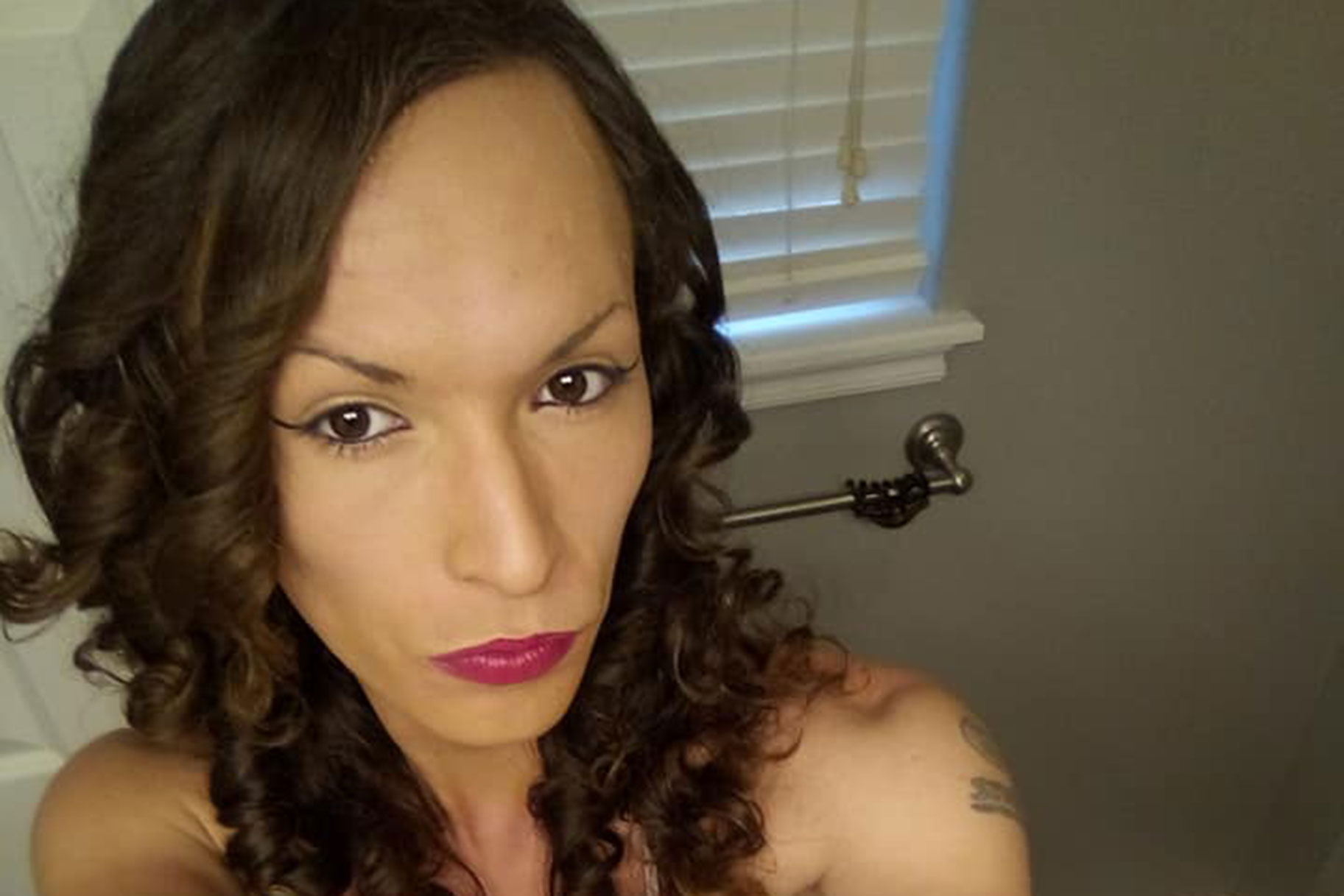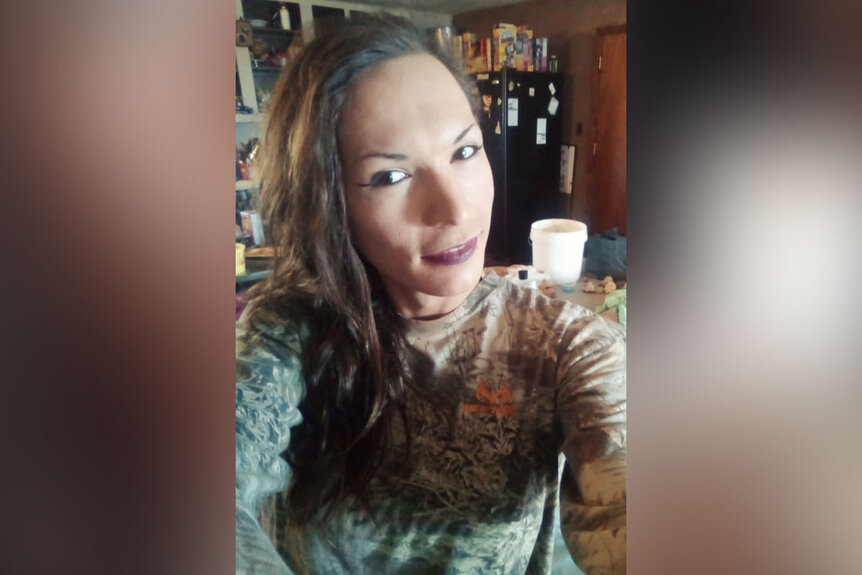Create a free profile to get unlimited access to exclusive videos, breaking news, sweepstakes, and more!
Family Of Missing Transgender Woman Hopes Her Story Will Highlight Violence Against Indigenous Communities
Aubrey Dameron, 25, went missing from her home near Grove, part of the Cherokee Nation of Oklahoma, in 2019 and hasn't been seen since.

Small-town whispers blossomed into rumors before news found its way back to family: Aubrey was gone.
Aubrey Dameron, 25, lived in the outskirts of Grove, part of the Cherokee Nation of Oklahoma. The Cherokee woman moved to the beat of her own drum, loved rock and roll, and carried with her an air of bubbly kindness and positivity. She returned to her family home that previous summer, where she lived with her mother, brother, and stepfather in rural Delaware County.
But in the early morning hours of March 9, 2019, Aubrey’s mother, Jen Byrd, woke up to use the bathroom at around 3:30 a.m. She saw Aubrey leaving the house, dressed all in black. Aubrey said she was going to meet someone.
She was never seen again.
A missing person’s report was filed with the Delaware County Sheriff’s Office on March 11 by the girlfriend of Aubrey’s brother, according to relatives.
When news got around to Aubrey’s maternal aunt and uncle, Pam Smith and Christian Fencer, red flags went up.
“Aubrey was epileptic, and she was dependent on medication,” Pam Smith told Oxygen.com. “Her medication was left, her purse was left, we have heard her phone was left.”
Aubrey also lived in a rural area that was not within walking distance of anywhere significant.
The family showed Oxygen.com a text where a detective said Aubrey’s phone last pinged at 3:42 a.m., not far from her home.
Christian and Pam, Jen Byrd’s siblings, said they feared Aubrey, a transgender woman in the process of transitioning, may have been the victim of a hate crime.
“She was finding out who she was, the person she’d been the entire time,” Christian told Oxygen.com. “That person happened to be Aubrey.”
In junior high, when Aubrey was still identifying as a male, she came out to friends and family. But it wasn’t always easy.
“She faced people mocking her and calling her transphobic slurs,” said Christian, who was only six months older than his niece and more like a brother than an uncle.
Christian explained that Aubrey was forced into an alternative school because her identity “was a distraction” to her classmates.
“When people ridiculed her, she never wanted revenge,” said Pam. “She’d pray for them. That’s who she was.”
Aubrey and her uncle shared a special bond growing up, as Christian identifies as a gay man who is all-too-familiar with the homophobic attitudes of some of the locals.
“She [eventually] found people who had worldly views,” Christian continued. “Views opposed to the ones that stopped at the city limit signs.”
Aubrey referred to herself as a Two-Spirit, a Native American term describing people possessing a blend of male and female spirits.
“Two-Spirits were held in high regard before colonization,” Christian told Oxygen.com. “They could walk between two worlds, the world of a woman and the world of a man. They were sacred.”
As relatives struggle to gain interest from locals in the region, they have found national support from indigenous groups who have stepped up to raise awareness of Aubrey’s case.
Deborah Maytubee Shipman, founder and director of the Missing and Murdered Indigenous Women USA, often referred to as the MMIWUSA, is one of the biggest supporters in Aubrey’s case.
“It’s hard enough being of another race, let alone somebody who is transgender [like Aubrey],” Shipman told Oxygen.com. “Our extra heart went out to [the family] because of that.”
Advocates like MMIWUSA are playing catch-up to account for murders and missing persons cases within Native American tribes, as many law enforcement agencies around the country have yet to collect data in such a way to make the community distinctive from the rest of the population.
A 2016 study showed that out of 5,712 cases of missing American Indian and Alaskan Native women, only 116 were ever entered into the D.O.J.’s federal database, according to the Urban Indian Health Institute, which collects its data from organizations like MMIWUSA.
Murder is the third-leading cause of death for Indigenous women.
Studies show that 56% of Native transgender people have attempted suicide, compared a rate of 41% among other transgender groups, according to the National Congress of American Indians.
Two-Spirits also experience a higher rate of violence, sexual and otherwise, than any other LGBTQ+ group.
“We’re out there, counting our dead,” Shipman told Oxygen.com.
Aubrey's family said acts of hate continued even after she was gone. People ripped missing person flyers from their posts. Some posted transphobic slurs on her social media pages. And when Pam and Christian hosted a silent auction in town to raise funds for their searches, very few showed up, and those who did were only curious about the details of the disappearance.
“It just seemed like nobody cared,” lamented Pam Smith.
The family said they struggled to get local authorities to spring into action.
“Because of her high-risk lifestyle, there [are] lots of possibilities about what happened or where she is,” then-Capt. Gayle Wells of the Delaware County Sheriff’s Office said, according to The Gayly.
Wells’s characterization of the case was criticized on the site for implying “that her gender identity… had a hand in what may have occurred to Aubrey.”
Speaking to Oxygen.com Friday, Wells, who noted that he retired in September of last year, cited Dameron’s lifestyle again.
“This was the last case I ever reviewed. I kept it in my office, within reach,” he said. “What made this case unique was her lifestyle. Not only was she transgender and very sexually active, but she was also a known drug abuser.”
“There was an investigative report, oh, 100 pages long,” Wells continued. “We made over 100 follow-up contacts in that case and never ever found anyone or anything that actually pointed us towards the location of Aubrey Dameron.”
The Delaware County Sheriff’s Office referred all inquiries to the FBI, who did not respond to media requests by Oxygen.com.
Since 2019, Pam and Christian conducted several searches, often assisted by the MMIWUSA.
“The MMIWUSA has been phenomenal,” Pam told Oxygen.com. “With searches, with helping fund a private investigator.”
“We’ve grown very close and fond of the women who make up that organization,” said Christian.
On March 23, a search team of about 30 people searched near the family home where Aubrey disappeared. Searchers found what appeared to be a bloody sock.
“The sock was found approximately half a mile east of the home,” said Pam Smith. “The sheriff’s office submitted it to the Oklahoma State Bureau Investigation, but we never got conclusive results.”
Around this time, Aubrey’s aunt and uncle created Missing-Aubrey Dameron from Grove, Oklahoma, a Facebook page devoted to finding her.
The family also received support from Crossroads K9 SAR in Louisiana, who reached out through the Facebook page and offered to assist in a search using their specially trained dogs.
On Nov. 21, 2019, four Crossroads K9 SAR dogs searched Aubrey’s family home. All four dogs hit on a cadaver’s scent on a tarp in the shed in the back yard, according to the Bartlesville Examiner-Enterprise.
Later that day, cadaver dogs hit on a scent at a nearby pond.
Authorities drained three feet of water and skimmed the pond, but nothing was found, the local paper reported.
Aubrey’s immediate family, including her mother, did not respond to interview requests from Oxygen.com.
In January of 2021, Oklahoma Representative Daniel Pae filed a bill to create “Aubrey’s Alert,” according to the Cherokee Phoenix. The bill aimed to send alerts for missing adults within Cherokee Nation.
The bill was later renamed as the “Kasey Alert,” referring to Cherokee native Kasey Russell, who disappeared from Seminole, Oklahoma in 2016, according to the Cherokee Phoenix.
Aubrey’s family claim negative feedback because Aubrey was transgender prompted the change of the bill’s name. They took to their Facebook page to voice their displeasure.
“Today, we received word that the Aubrey Alert will need a name change before it can move forward from the open session. Due to Aubrey being transgender in a red state, multiple ELECTED OFFICIALS have stated they will not support the bill due to it being named after Aubrey Dameron. We are deeply saddened by this update but will continue to search for Aubrey and raised awareness when we are given the opportunity. Wado!”
"Wado" is the English spelling of "Thank you" in Cherokee.
“When Aubrey vanished, this world lost a light that not a lot of people carry,” said Christian. “We’re fighting for her like she fought to be who she was. This, too, isn’t going to break us.”
“We’re still counting our dead,” said Deborah Shipman. When asked what she would say to those who possibly targeted Aubrey and other Two-Spirits, she said, “Give up. We are not going to stop.”
“The tracking skills that we had in our ancestors’ day are only equalized by the skills we have now,” Shipman continued. “And we’ve gotten really good at it.”
“I wake up with a broken heart every single day,” said Pam. “Not knowing if Aubrey is safe somewhere or if she has walked on.”
Pam and Christian are grateful for the outpouring of support from beyond their region and hope more within Oklahoma will help.
“It’s high risk to be Native American. It’s high risk to be transgender,” continued Christian. “Aubrey was both those things, but she was both those things unapologetically.”
Aubrey’s last Facebook post, dated Feb. 25, 2019, shows a sign that reads: “You’re never too important to be nice to people.”
Anyone with information is urged to contact the FBI at (918) 664-3300 or Cherokee Nation Marshal Service (918) 207-3800.


























